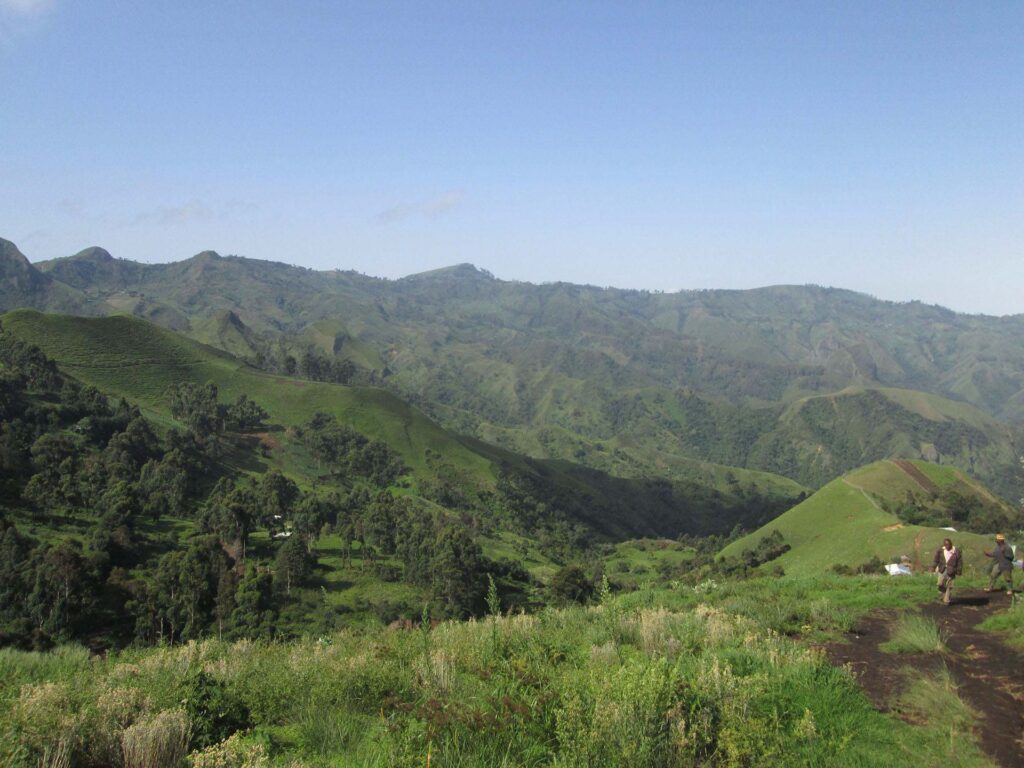
What is MBI?
The Mount Bamboutos Initiative (MBI) is a joint initiative developed by ERuDeF and ITF in partnership with the government of Cameroon that aims to restore the biodiversity and ecosystem functions of the degraded Mount Bamboutos landscape while securing the livelihoods of local and indigenous population. Specifically, the project aims to restore 35,000 hectares of the degraded landscape through the planting of 15 million agroforestry and indigenous tree species to secure the livelihoods of over 30,000 people. Due to anthropogenic activities such as poaching, deforestation, bush fires, poor farming practices and urbanization, the Mount Bamboutos landscape has been severely degraded. Therefore ERuDeF has taken various steps to salvage the landscape with objectives in relation to governance, livelihoods development, biodiversity, forest landscape restoration, biodiversity, research and development and sustainable finance. The objectives are as follows:
- To train and build the capacity of over 30,000 local community members to manage the Mt. Bamboutos fragile ecosystems.
- To introduce and establish land use and effective governance systems for the Mt. Bamboutos ecosystem.
- To ensure food security and economic resilience for over 30,000 households in the Mt. Bamboutos area while integrating women & gender considerations up stream.
- To restore over 35,000 ha of the degraded landscape of the Mt. Bamboutos ecosystem through the planting of 15 million trees.
- community forests (10,000 ha) and riparian forests (5,000 ha).
- To use applied research results to support the development of the Mt. Bamboutos ecosystem.
- To establish a long term sustainable funding mechanism for Mt. Bamboutos both at the community and the larger level through the establishment of the community foundation and the Mt Bamboutos conservation trust fund.
The project was launched in August 2018 with the support from the Darwin Initiative, TreeSisters, FFEM (French Global Fund for Environment small grants programme) and, ERuDeF in collaboration with ITF. As from 2019 Trees for the Future has joined the restoration efforts for the Mount Bamboutos landscape.
The Mount Bamboutos landscape cuts across three regions; West, South West and North West regions of Cameroon. MBI is currently being implemented in 9 villages spanning 4 divisions in Cameroon; Bafou, Bangang, Babadjou, Buchi, Menka, Pinyin, Bamumbu, Fossimondi and M’mouckmbie.
Why this location?
Historically, Mount Bamboutos has been known as one of the West and Central African top biodiversity hotspots; home to primates, birds, amphibians and plants, including high numbers of endemic species. However, anthropogenic pressures and poor implementation of regulations, along with lack of legal protection, have caused severe deforestation and degradation. Therefore we have chosen this location because we want to bring back the biodiversity hotspots. The mountain is also the second highest water tower in Cameroon supplying at least one third of water feeding the major hydro-power system in Cameroon at Edea. However it is already losing function as a water catchment.
Parts of Mt Bamboutos have been almost completely deforested and converted to agriculture and settlements. The upper slopes and caldera are largely used as pasture, and intensive horticulture is increasingly practiced. As a result of the habitat loss, biodiversity has been severely reduced, with many of the species going into local extinction. What remains of the global biodiversity today, in the piedmont sections and steep gallery forests of this mountain, includes: the Preuss’ Guenon (Cercopithecus preussi), Coopers Mountain Squirrel (Paraxerus cooperi), the Bannerman’s Turaco (Tauraco bannermani), the Bamenda Pririt (Latysteira laticincta), the Cross River gorillas (Gorilla gorilla diehli), the Nigeria-Cameroon chimpanzees (Pan troglodytes ellioti), the Ternstroemia sp and Allanblankia gabonensis.
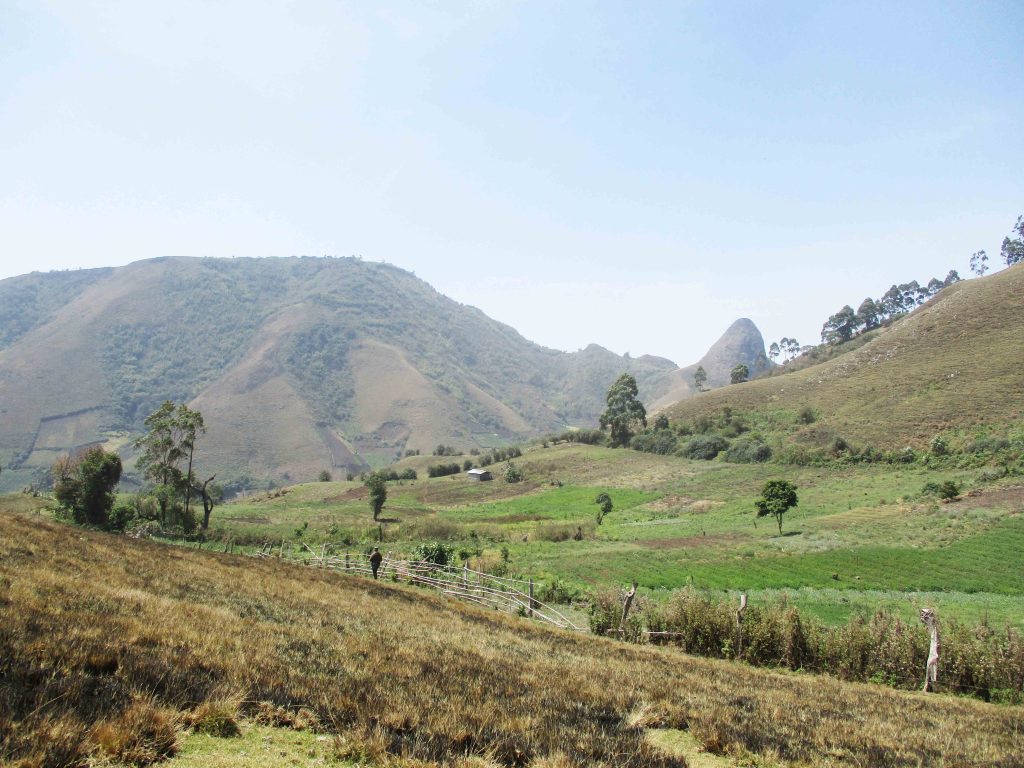
Challenges Faced by Local Population and Farmers
Today, over 30,000 rural people depend directly on the Mount Bamboutos ecosystem for their livelihoods. The destruction of forests in almost all catchments has led to serious water shortages. Demographic pressure on limited land has resulted in encroachment into marginal sloping areas, causing continuous erosion and regular landslides.
Intensification of agriculture and horticulture continues to lead to soil erosion, poor soil quality and food and water contamination, which will result in decreasing yields, reduced incomes and possible food insecurity. Farmers have been using high levels of fertilizers and pesticides for the horticultural crops, and may have a poor understanding of the real economic and environmental costs – hence the high risk of increased soil and agro ecosystem degradation and declining crop yields. Poverty remains widespread, 75% of the rural Cameroonian population live below the poverty line. Agroforestry and sustainable farming, indigenous non-timber forest product (NTFP) value addition and improved access to markets, will improve livelihoods and economic resilience. Agroforestry will increase tree cover, improve soil quality and fertility; improve crop diversification and agroecosystem functions.
In parallel, native tree planting and regeneration in community, riverine and sacred forests will re-establish biodiversity, consequently, commencing the process of ecosystem restoration. This will open up future opportunities for eco-tourism and associated income generation.
Who’s Involved?
The implementation of the project has taken a participatory bottom-up approach where focus groups, key informants, opinion leaders, community groups and peer groups are being used to engage all stakeholders. The project will work mainly through local institutional structures: the local authorities (Fons/chiefs and traditional structures; who provide entry points for community engagement,) the Village Forest Management Committees (VFMCs), Women and youth groups, and municipal councils. ‘What we really need is ownership and decisions coming from the local authorities as to how the ecosystem can better be restored. This will lead to the development of local rules and regulations combined with sustainable management of natural resources,’ stated MBI project Coordinator Mr. Deh Nji.
Particular emphasis has been placed on the involvement of women and youths as the main users of natural resources, and managers of farms. Their participation will continue to be encouraged in all project activities, where necessary through additional capacity building support. The project’s focus on tree based value chains is designed to address women’s needs (70% beneficiaries will be women). Women will also take significant leadership roles in the governance structure of the project. Inclusion of women and young people in all project activities will also improve governance, and build ownership of the project.

‘Presently we have crops that have started germinating, but it lacks water due to no rain. We are just waiting and hoping that rain will come. We also hope to meet experts who could teach us what to do in times like this.’ – student farmer on the MBI site deforestation’s effect on climate change.
“The Mount Bamboutos has lost all its glory. It was one of the mountainous reserves in Africa with exceptional species such as gorillas and chimpanzees. Today, all these varieties are downstream” Chief of Bangang HRH Momo Serge Evarist, on the effects of the degraded land on species migration.
‘Due to Mount Bamboutos location, there is no official stake of claim as to who the land belongs to. So we’ve seen an influx of farmers belonging to these regions harvest and plant their crops on lands where the local community (Bororos who are mainly herdsmen) rear cattle, sheep and horses. An encroachment of farmlands on these pastures has caused tensions to arise between farmers and herdsmen as the increase in unregulated farming is decreasing grazing spaces for the herdsmen’s livestock.’- Regional Delegate of Forestry Wildlife and Sustainability on land conflicts which have arisen.
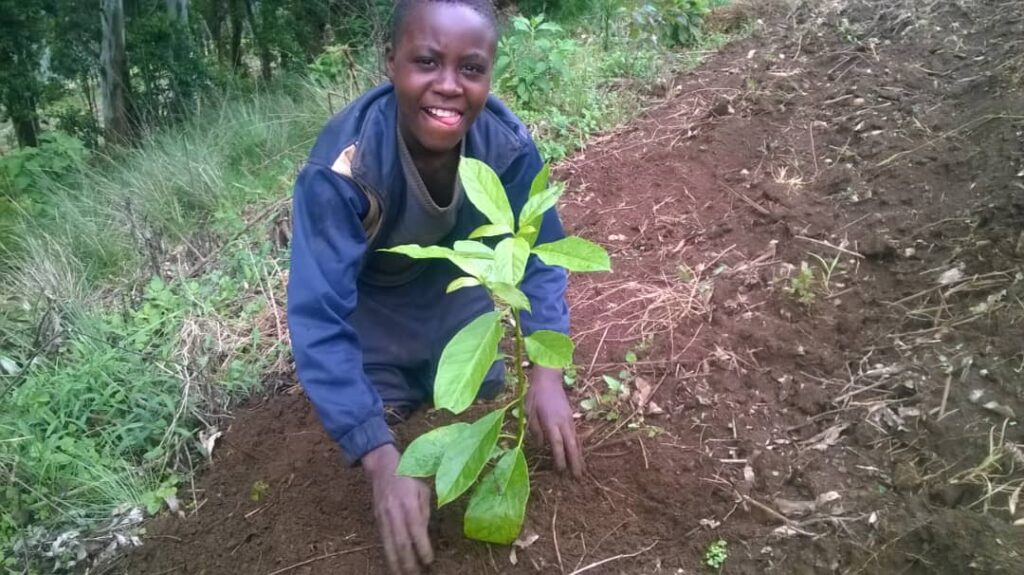
Although women make up over 50% of Cameroon’s population and produce 80% of the country’s food needs, they own just 2% of the land. There is a clear division of labour, with men responsible for cash crops – which bring in more income – while women are responsible for subsistence farming, often mainly for household consumption.
We aim to improve gender equality in all outputs of the project, with most activities aiming to achieve at least 50% women participants. More productive farms, more diverse products and better marketing of crops will lead to women’s economic empowerment and better representation in decision making structures at household and governance level. Education, information and training approaches will be adapted as necessary to promote the active engagement of women and youth in governance and participation.
What We’ve Accomplished So Far
-Increased awareness
Over 2500 people in and around the Bamboutos Mountains are now aware of the urgent need to restore the degraded mount Bamboutos landscape. Community members are now conscious about the negative effects of the degradation of the landscape and the need to change some of their destructive practices.
“This morning, water flooded in to our farms, off rooted our potatoes, leeks, cabbages and carrots that we planted for the dry season. We are so worried about this event which is ruining our futures. We salute the action of the MBI project for training us and encouraging us to plant trees. The planting of raffia and other trees will help stop the problem of floods that we are currently facing.” NANFACK Pierre, 52 years, chief of Femmock 3– Bafou North
“The upper section of my farm has suffered from infertility for a couple of years, while the lower section has suffered from drought. During the rainy season, water flows from the mountain top and swept away all the crops planted in the lower section. I will like to plant soil enriching tree species that can solve the problem of infertility and some economic trees that will yield more income and help prevent the destructive erosion”. KOFFO Michel, 52 years, Bawa-Babadjou
Most farmers now are interested in growing fruit and Non-timber forest product (NTFP). They acknowledged the fact that the cultivation of horticultural crops requires a lot of chemical inputs for high yields compared to the cultivation of fruit trees and NTFPs. They are now shifting from their most cherished market gardening to sustainable fruit tree cultivation.
“I have been cultivating Irish potatoes in this farm for many years. I have realized that I spend much on chemical inputs compared to what I gain from the crops. I want to replace Irish potatoes cultivation with fruit trees such as avocado and plum that require less daily care and provide sustainable long-term income. Trees don’t require chemical inputs”. Madam Yimele Collete, 55 years, Ngui-Bafou North
Capacity building
The project has strengthened the capacities of nearly 750 farmers (52% women) in nine villages. The farmers knowledge and skills have improved on the following: nursery establishment and management, agroforestry techniques; contour farming, cultivation of fruit trees and non-timber forest trees, and vegetative propagation techniques such as: grafting and layering and tree planting techniques. Approximately 34% of the farmers are now practicing these activities on their farms.
“I have learned a lot from ERuDeF. Thanks to the training program on nursery establishment and management, I have established my own individual nursery for avocadoe, with a capacity of 1000 plants. I have also planted 700 grafted avocadoe seedlings in my farm. The future of Bafou lies in the production of avocadoe. The factory for the transformation of avocadoe that was installed in Mbouda lacks the required quantity of avocadoe for it to start operating. Also, the internal market for avocadoe is flourishing. M. MEZATIO Gaston, 63 years, Chief of Sankia-Bafou north
-Tree planting and Restoration of degraded lands
The project has planted 143,298 agroforestry and native forest species trees to launch the restoration of 3,000 ha of forests and biodiversity habitat in the degraded Mt. Bamboutos ecosystem.
In the Northwest and West regional sections of the landscape, 49,820 native forest trees were planted in degraded sacred forests, community forest lands, water catchment and riverine forests. Aproximately, 15,596 agroforestry trees were planted in farm lands.
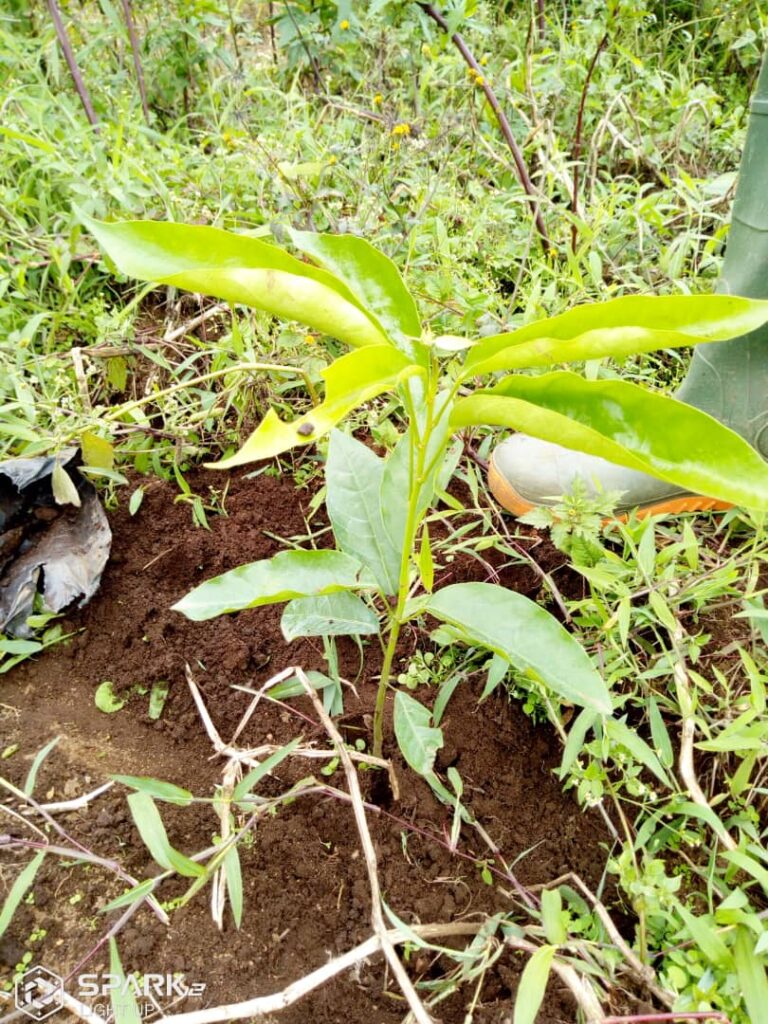
In the Southwest regional section, 57,452 seedlings of different tree species were planted in community forest lands, riverine forests, sacred forests and water catchment areas. Atleast, 20,430 agroforestry trees were also planted in degraded farm lands.
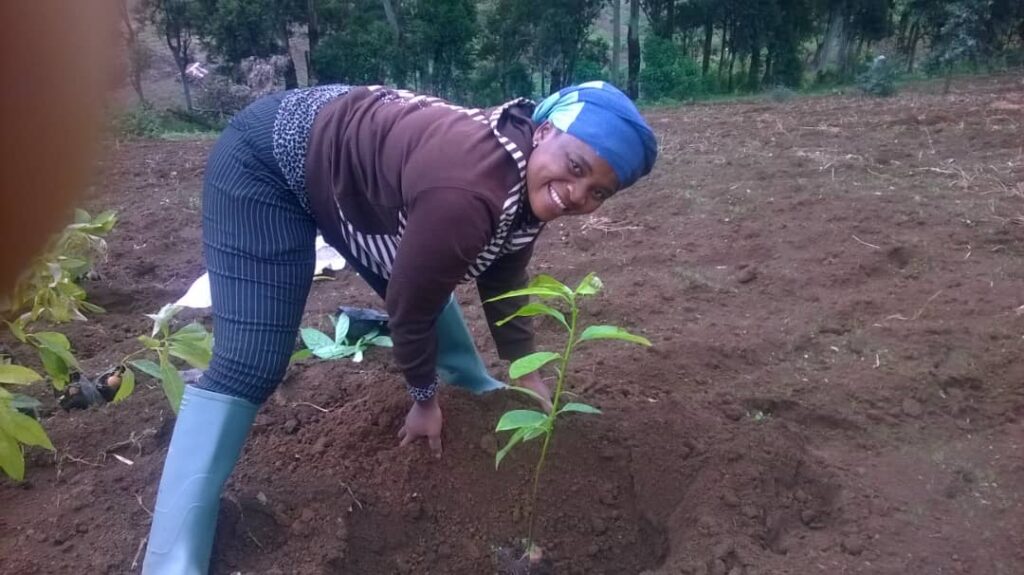
-Community stakeholders engagement
The project has attracted the interest and support of community members and other local stakeholders. At least 750 farmers (52% women) in nine villages are actively engaged and committed to the restoration process through the uptake of agroforestry, tree planting in degraded community lands, volunteering as village forest management committee members, identifying degraded areas in their villages and proposing restoration interventions to be carried out in certain areas. More than 72 community members, men and women, in 9 villages are committed to managing the restoration forest land by volunteering as members of the village forest management committees. They are leading the process of tree planting and participatory monitoring and evaluation of trees planted in their respective communities.
One remarkable step forward is the creation of the Mount Bamboutos Fons’ Association (MBFA), with 14 chiefs (traditional rulers and kings of the area) pledging unflinching support. They are advocating for portions of lands in their communities to be set aside for restoration interventions. They have also agreed to set up local rules and regulations for sustainable land use management in their respective villages and the landscape as a whole. They have also claim ownership of the Mount Bamboutos Tree Day and they shall be celebrating the day annually in their respective chiefdoms in order to promote tree planting. “We are fully behind the success of the MBI. We will do everything in our capacity as traditional rulers in order to see that the project succeeds”. HRM Senator Fon Lekunze, president of the MBFA.

The project has also supported the putting in place of regional platforms for dialogue and consultation as well project monitoring and evaluation. These platforms enable community members and other stakeholders in the project to evaluate the project and contribute ideas based on their knowledge.
–Strengthening CBOs
The project has provided young and inexperienced community based organisations the opportunity to strengthen their capacities by interacting with more experienced organisations. These CBOs include: Operation Green Space (OGS) in the Lebialem, Green Impact in Menoua, Community Aid In Development (COMAID) in Mezam, and Bamboutos Agroforestry Network in Bamboutos division. They are now playing a vital role in building the capacity of the community members and offering technical assistance to the farmers and other stakeholders.
In perspective, we will work harder to complete process for participatory land use planning in two villages at sub-divisional levels, raise and plant 400000 agroforestry and forest tree species by 2020, and continue to strengthen the capacity of the local people to take necessary steps towards the restoration initiative. We will build a coalition of stakeholders for participatory land use planning and management, strengthen the project governance system, and continue to raise awareness to restore the Mount Bamboutos ecosystem.
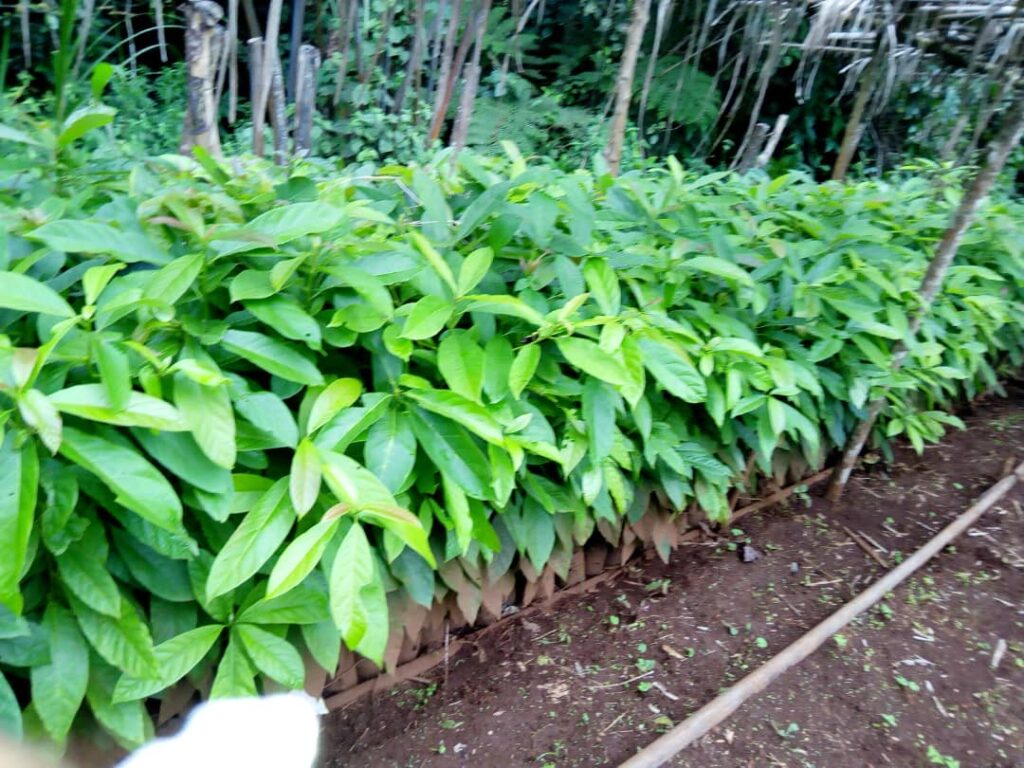
Prospective Impacts
Through MBI, beneficiaries’ living standards will increase, as agroforestry improves soil quality and crop yields increase. An estimated 30,000 households will have improved marketing and business models as they gain skills on value addition and cost benefit analysis. The project will also lead to an increase in economic resilience for over 30,000 households as 5 million agroforestry trees, NTFPs and fruit trees will be planted, providing diversified crops and a basis for cottage industries in the future.
In addition, women and youths will gain economic empowerment through diversified farming systems, NTFPs and training in market analysis. Women will be actively targeted in all activities, with the aim of improving both economic standing and participation in decision making processes.
The project will help improve the quality and quantity of water reaching the communities to help people meet their needs. Communities from the villages involved, including the pastoralist community, now have a better understanding of the benefits and consequences of environmental/livelihoods issues, and are taking ownership for the protection and restoration of Mt. Bamboutos.
What this Project Means to Us
At ERuDeF, our mission is to conserve biodiversity and protect environments through research, training, education and community engagement. As an organization, we protect environments through the creation of protected areas, community forests and forest restoration programs. We work with indigenous communities to protect forests which they call home. By investing directly in indigenous communities, we connect people who are deeply motivated to conserve their ancestral lands with the tools, training, and resources necessary to protect their rainforests. We encourage these communities to adopt agroforestry, agro ecology and community forestry programmes in a bid to ensure their holistic development; increase their food and nutritional security, reinforce income generation opportunities, health and education.
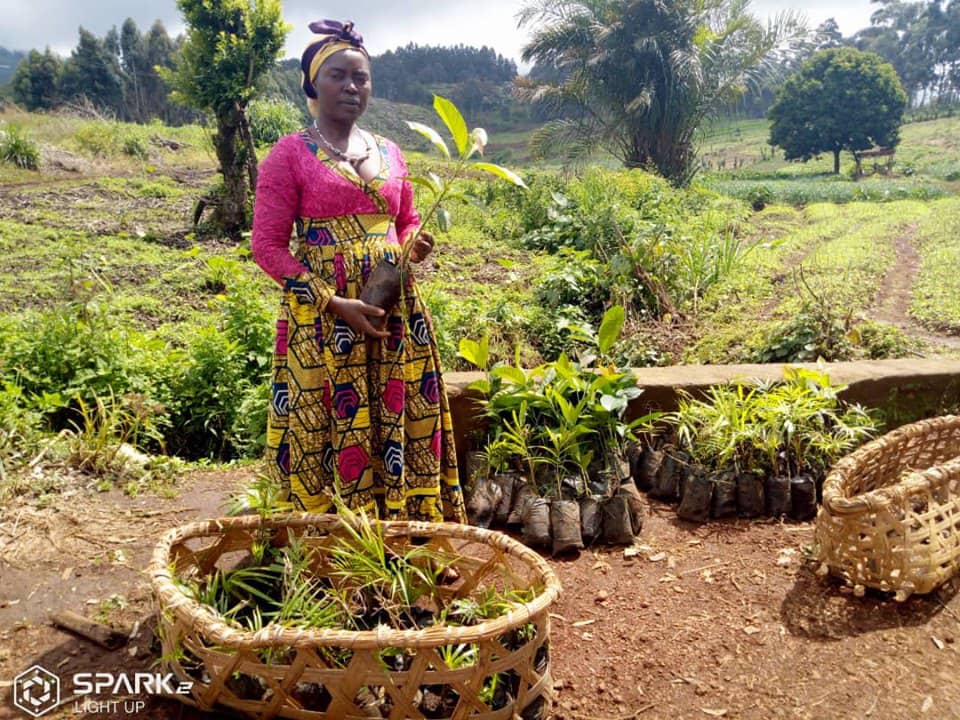
At the very core, MBI aids in accomplishing ERuDeF’s biodiversity restoration mission through the planting and regeneration of trees which will not only slow deforestation through developing alternative sustainable livelihoods, but will also mitigate the effects of climate change through carbon sequestering, thus contributing to the climate action goal. This project strikes a particular chord with us, as it strives to achieve additional pertinent sustainable development goals, crucial to the landscape’s community. These key goals include; no poverty, zero hunger, gender equality, clean water and sanitation, decent work and economic growth.
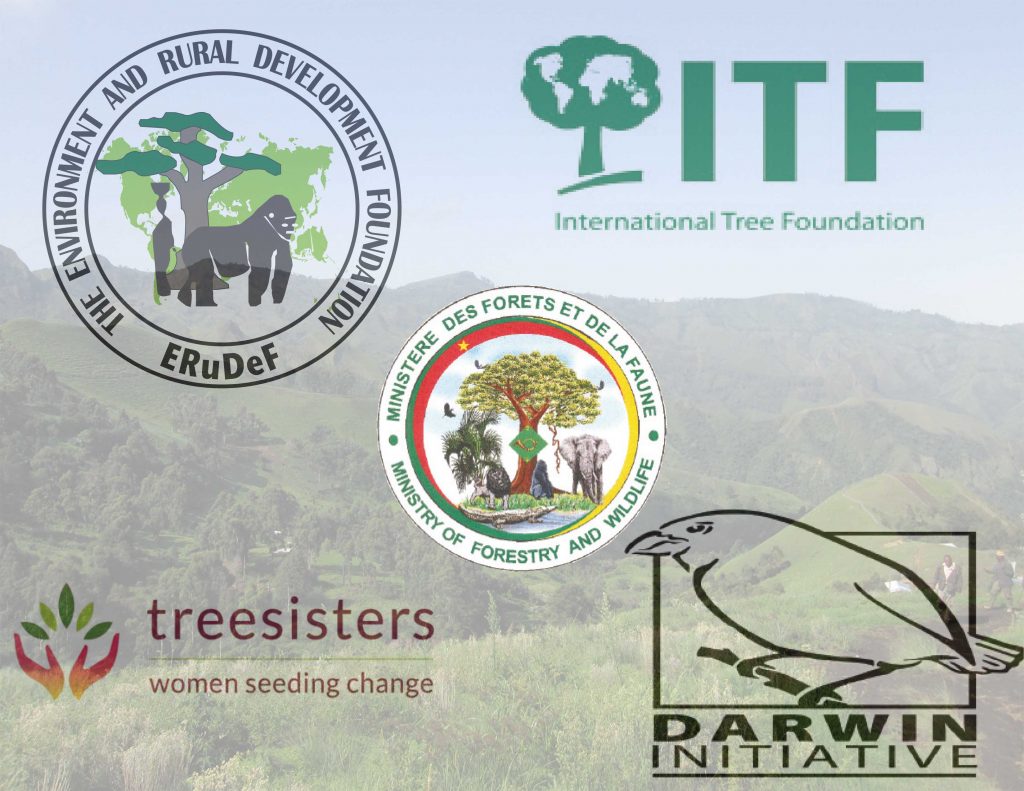
Stakeholders chat way forward for participatory land use planning of the Mount Bamboutos ecosystem
The meeting which took place on December 27th, 2019, in Mbouda, West region of Cameroon, saw the participation of different stakeholder groups that have a stake in the management of the Mount Bamboutos area. The meeting was attended by traditional authorities of the concerned villages, representative of village development and cultural associations, representative of women and youths from each of the concerned villages, representatives of the Mbororos, representatives of municipal councils, regional and divisional delegates, relevant sectorial ministries, and representatives of local non-governmental organizations.
The meeting was facilitated by the geographical information system officer at ERuDeF, Mr. Younchahou Mfonkwet, under the chairmanship of the coordinator of the Mount Bamboutos Initiative project, Mr. Asabaimbi Deh Nji. The main aim of the meeting was “ to build a coalition of stakeholders in order to reach an agreement on the process for participatory land use planning for the Mt Bamboutos ecosystem”.
During the meeting, the current state of the degraded Mount Bamboutos ecosystem, problems faced and conflictual situations in the mountain area, the need and importance of the participatory land use planning were presented to the stakeholders in order to enable them have a clear understanding of the subject matter.
After deliberations on the degraded state of the mountain ecosystem, all participants mutually agreed that there is a need to develop a participatory land use plan for the entire Mount Bamboutos and to form a coalition of stakeholders that would promote the inclusiveness of all the stakeholder groups in the process.
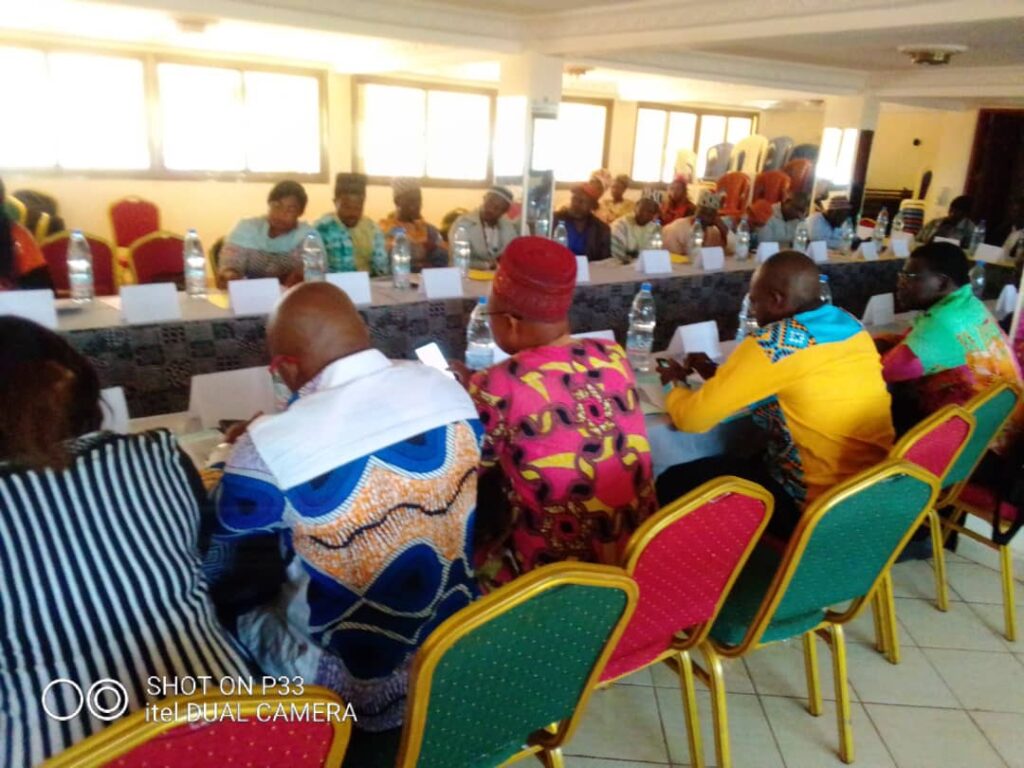
Having agreed on the need for PLUP for the entire mountain ecosystem, the participants examined and reviewed the document on the framework and ground-rules for participatory land use planning for the entire Mt. Bamboutos ecosystem in conformity with existing land use planning protocols in Cameroon. It was recommended that the team should consult the sectorial ministry in charge of land planning in Cameroon, that is, MINEPAT, so as to be sure the procedures are the same. This culminated to the creation of a coalition of stakeholders for the PLUP for the entire Mount Bamboutos ecosystem. The platform constituted of representatives of different stakeholders groups selected by the participants.
It is worth noting that the raison d’être to put in place a participatory land use plan for the entire mountain is to ensure good land use governance and sustainable management of the resources of the mountain ecosystem. This falls inline with one of the objectives of the Mount Bamboutos Initiative.
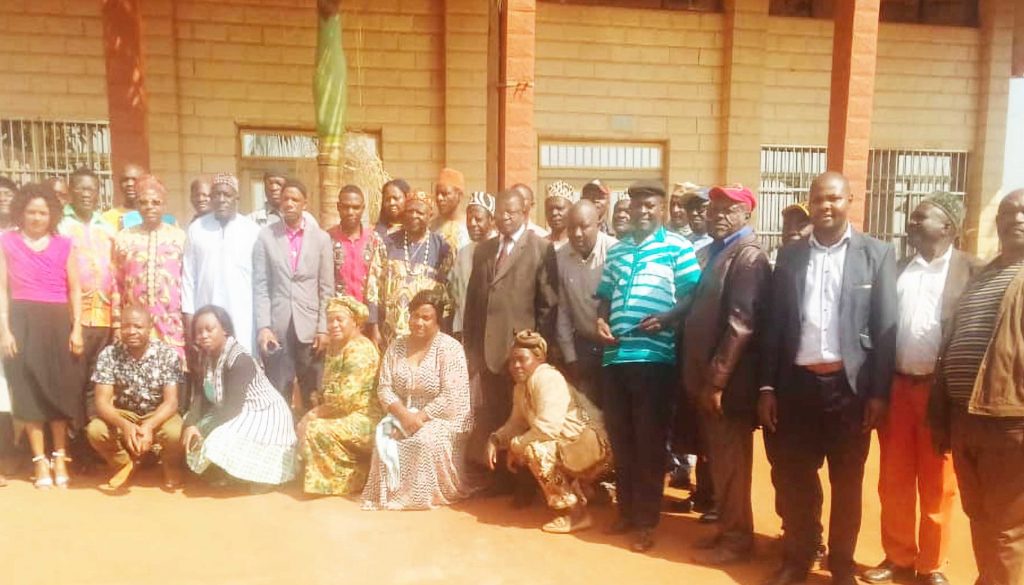
It should be noted also that the Mount Bamboutos Initiative (MBI) is a joint initiative developed by ERuDeF and ITF in partnership with the government of Cameroon that aims to restore the biodiversity and ecosystem functions of the degraded Mount Bamboutos landscape while securing the livelihoods of local and indigenous population. Specifically, the project aims to restore 35,000 hectares of the degraded landscape through the planting of 15 million agroforestry and indigenous tree species to secure the livelihoods of over 30,000 people. Due to anthropogenic activities such as poaching, deforestation, bush fires, poor farming practices and urbanization, the Mount Bamboutos landscape has been severely degraded.

